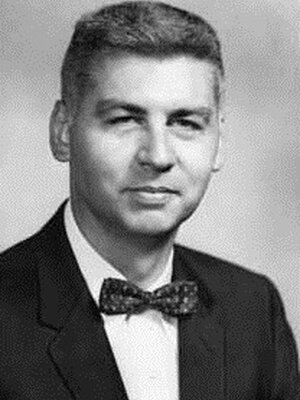
Peter Ewald Yankwich, a former University of Illinois professor and administrator, died at 5:34 pm Wednesday December 1, 2004 at Cottage Hospital, Santa Barbara, CA. He was 81. He is survived by his wife, two sons, a daughter, and a sister, and was preceded in death by two brothers.
Professor Yankwich was born October 20, 1923 in Los Angeles, a son of Leon Rene and Helen Werner Yankwich. He married Elizabeth Ingram on July 14, 1945 in South Pasadena, CA. Professor Yankwich graduated from the University of California at Berkeley with a BS degree in chemistry in 1943 and with a PhD in physical chemistry 1945. He was a member of Phi Beta Kappa.
In the spring of 1944 he joined the Scientific Staff of the UC Radiation Laboratory, serving until the Fall of 1946 on the Manhattan Project. In September of 1946 he joined Professor Melvin Calvin as a founding member of the RadLab's Bio-Organic Group, later the Laboratory of Chemical Bio-Dynamics. During the 1947-48 academic year, he was appointed instructor in chemistry in Berkeley's chemistry department.
He was professor of chemistry at the University of Illinois from 1948 to 1988, head of the division of physical chemistry in the University of Illinois chemistry department from 1962 to 1967, and vice president for academic affairs (Provost) at the University of Illinois from 1977 to 1982.
He served as a member of NSF's Advisory Council on College Chemistry during the whole of its existence (1962-68), and was one of the active founders of its College Chemistry Consultants Service. In 1971, Professor Yankwich was appointed to Chemistry Education Planning and Coordinating Committee of the ACS, serving as its chair from 1974 to 1977. He was chair of the ACS Education Commission from 1978 to 1981, and was an original member of the ACS Committee on Chemical Education. Thus, for nearly a decade, he led the ACS bodies responsible for the coordination of all the Society's education activities. Yankwich organized an ACS Chemistry Education Task Force that wrote a 1984 report called "Tomorrow" that made 39 specific recommendations for those responsible for the conduct and quality of chemistry education in the US. He moved to Washington DC in 1985 and joined the staff of the National Science Foundation, where he focused on the future of chemistry education. He was on the senior staff of NSF's education directorate until 1999.
Professor Yankwich was internationally recognized for his contributions to three fields of scientific research: the chemical effects of nuclear transformations, the application of radiocarbon tracers to the elucidation of chemical reaction mechanisms, and isotope mass effects on chemical reaction rates. His principal contribution was a long series of experimental and theoretical studies of isotope rate effects.
He was elected a fellow of the American Association for the Advancement of Science (1963), a fellow of the American Physical Society (1970), and served as chairman of the Gordon Research Conference on the Chemistry and Physics of Isotopes (1964). He also was an associate member of the University of Illinois Center for Advanced Study (1970-71), and chair of the Division of Physical Chemistry of the American Chemical Society (1971-72). He received the Wakefield Award in 1975 for "excellence as a teacher and scholar and for outstanding service to the University, State, and Nation."